Jump to section
- The HKIS Core Values
- SLR Operational Definitions
- Academic Excellence
- Spirituality
- Character Development
- Self-Motivated Learning
- Contributing to Society
- Chinese Culture
- Learning Principles and Practices
- Teaching for Understanding
- Philosophy of Assessment
- Relevant and Accurate
- Ongoing
- Informative and Timely
- Understandable
- Glossary
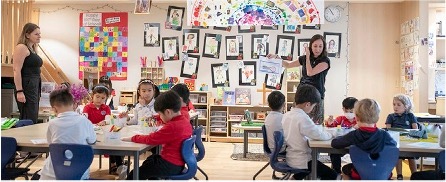 Only with a shared purpose and shared vocabulary can a large organization progress steadily in the right direction. Hong Kong International School, with a large and diverse population of students, faculty and community members must strive to remain focused on the path ahead, ensuring all are operating with the same milestones along that path in order to arrive at the same destination.This Shared Philosophy of Education document assembles these milestones for ease of reference. In the Shared Philosophy of Education are presented those foundational principles upon which our practice and ethos are based. They are definitions of what we believe about our mission, what we desire for our students, how people learn, why and how we teach for understanding, and how best to assess the effect we are having in our work as a school. The documents collected in this single format have been created over the life of the school by all facets of the school community. Complementing one another in a unified definition of our work together, they comprise a shared vision for education at HKIS.
Only with a shared purpose and shared vocabulary can a large organization progress steadily in the right direction. Hong Kong International School, with a large and diverse population of students, faculty and community members must strive to remain focused on the path ahead, ensuring all are operating with the same milestones along that path in order to arrive at the same destination.This Shared Philosophy of Education document assembles these milestones for ease of reference. In the Shared Philosophy of Education are presented those foundational principles upon which our practice and ethos are based. They are definitions of what we believe about our mission, what we desire for our students, how people learn, why and how we teach for understanding, and how best to assess the effect we are having in our work as a school. The documents collected in this single format have been created over the life of the school by all facets of the school community. Complementing one another in a unified definition of our work together, they comprise a shared vision for education at HKIS.The HKIS Core Values
We believe that:- Diversity enriches community and strengthens society.Life-long learning is vital for individuals to thrive in and contribute to a changing society.Society progresses when individuals strive for excellence and seek challenges.Learning thrives in the presence of shared high expectations and mutually respectful relationships.Integrity is essential to trust and credibility.Each human life has value and purpose.Dialogue about Christianity and other religions is valuable for personal growth and development of spiritual identity.Together, parents, faculty, staff, and students create the conditions for children’s success and a healthy lifestyle.
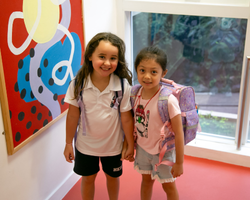
SLR Operational Definitions
 Academic Excellence
Academic Excellence
All students will be equipped and empowered to meet the challenges of a dynamic global society in which they collaborate, contribute and flourish as critical thinkers, problem solvers and creative individuals committed to excellence.All students will demonstrate these abilities through:Gathering Knowledge (Inquire; think critically; gather knowledge)- Formulating and refining questions.Using a variety of resources.Finding, evaluating, selecting information.Making personal connections.Mastering technology tools.
- Applying critical-thinking skills (analysis, synthesis, evaluation, organization)to knowledge to construct new understandings.Collaborating to solve problems.Using technology tools to analyze and organize.
- Sharing new understandings and reflecting on the learning.Creating products to communicate new understandings effectively.Applying learning to new and/or real-life situations.Practicing responsible and ethical behavior.
 Spirituality
Spirituality
Students will exhibit understanding of Christianity by:- Describing and explaining the key principles of Christianity.Connecting Christian terminology and symbols to key principles.Making sense of the multiple ways the Bible is interpreted within the Christian community.Comparing key concepts, teachings, practices and texts of Christianity.Recognizing a connection between Christian principles and ethical conduct.
- Describing and explaining the key principles of other religions.Connecting terminology and symbols from other religions to key principles from other religions.Making sense of the multiple ways other sacred writings are interpreted.Recognizing a connection between Christian principles and ethical conduct.Comparing key concepts, teachings, practices, and texts of other religions.Recognizing connections between the principles of other religions and ethical conduct.
- Respecting the religious rituals/spirituality of others.Respecting the diverse religious and spiritual lives and traditions of others.
- Engaging in dialogue about Christianity and other religious worldviews in daily life.Identifying connections with their personal beliefs and others.Reflecting upon their own spiritual identities.Living out their worldviews in a variety of ways.
 Character Development
Character Development
Students will demonstrate caring and respect by:- Identifying others’ needs and looking for ways to help.Fostering care and respect in the community.Valuing the differences among people.Exhibiting self-control.Listening and interacting in an appropriate manner.Being considerate of materials, facilities and resources.
- Demonstrating honesty and trustworthiness in relationships and academics.Accepting responsibility for their own actions.
- Identifying with a value system based on ethical principles.Speaking or acting in accordance with their values.Supporting others who speak or act with courage.
 Self-Motivated Learning
Self-Motivated Learning
Students demonstrate persistence and engagement by:- Recognizing their intellectual style, strengths and weaknesses.Consistently applying different strategies to enhance interest until a goal is achieved.Sustaining or increasing effort in the face of difficulty.Actively seeking help when necessary.
- Applying new strategies to different assignments and projects.Seeking and engaging in challenging tasks that enhance learning.Exploring new interests.
- Engaging in effective thinking about their own thinking (meta cognition).Knowing a variety of key learning and motivation strategies.Appropriately applying a variety of learning and motivation strategies.Respecting the diverse learning needs and styles of other students.
- Accurately self-assessing on an on-going basis.Continuously reflecting, setting, monitoring and revising goals.Accepting feedback and criticism without defensiveness.Adapting and adjusting learning and motivation strategies used to meet their needs.
- Pursuing personal interests.Taking learning risks when their interest is piqued.Showing persistence in an area of passion.

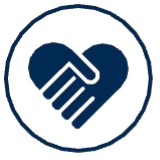 Contributing to Society
Contributing to Society
Students will demonstrate appropriate interpersonal skills by:- Working well with others.Respecting other points of view.Accepting diversity.Actively participating.Listening and making connections with others.Building cross cultural relationships.Working with others to achieve goals.Helping to resolve conflicts.
- Identifying a need.Voluntarily participating in service.Contributing time, talent or money, often involving a personal sacrifice.Appreciating the value of service.Contributing to family, community and/or the world.Following through on service commitments.Reflecting on service experiences.Studying in the classroom issues raised by their service experiences.
- Remaining conversant on current events.Being aware of the impact of major global, social and environmental events.Confronting discrimination and stereotypes.Appreciating global diversity.Developing a multi-cultural perspective.Empathizing with those representing a minority position.
 Chinese Culture
Chinese Culture
Students will demonstrate understanding of China in each of the following areas:- Social sciences (such as history, geography, politics and current events).Philosophy and religion.Language, literature and the arts.Chinese society (such as traditions and lifestyles).
- Making connections between personal experiences and aspects of Chinese culture.Being actively involved in a variety of Chinese cultural experiences.Behaving in culturally appropriate ways.Integrating with the people of Greater China and their communities.

Learning Principles and Practices
At HKIS we believe that learning is most effective when:- Learning is nurtured in a safe and supportive environment. Therefore, we will:
- Build positive relationships.Seek ways to foster students’ enjoyment of learning.Build strong learning communities that promote a culture of respect.Promote students’ self-confidence, ability to see other perspectives,and willingness to take risks with their learning.Recognize mistakes as learning opportunities.Provide space and resources conducive to learning.
- Connect with, challenge, and extend students’ present knowledge, skills,and understanding.Help students build skills in inquiry: asking probing questions and maintaining curiosity.Seek to connect students’ learning and the world at large.Focus on teaching for enduring understanding guided by essential questions.
- Provide opportunities for students to raise questions, solve problems, and reason.Use instruction and assessment strategies that support the transfer of learning.Provide opportunities for students to demonstrate understanding by applying prior knowledge and skills to new challenges and experiences.
- Use a range of strategies to identify and respond to students’ different learning and social needs, and cultural perspectives.Provide a variety of learning opportunities which enable students to build on personal strengths and interests.Empower students to advocate for their own learning as appropriate.
- Plan experiences that build and develop skills for learning through both collaboration and individual reflection.Structure opportunities for students to learn with others inside and outside of the classroom.
- Explicitly teach and model how to self-reflect, self-assess, and use feedback.Empower students to communicate about their own process of learning.
- Share and construct learning goals with students.Use formative and summative assessment as an ongoing part of the teaching and learning process.Assess understanding in various ways, including authentic, performance-based tasks.Use assessment data for teachers and students to guide future instruction and learning.
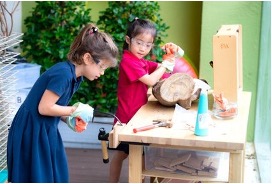
Teaching for Understanding
HKIS uses a comprehensive standards-basedii curriculum in which we teach for understanding. We align curriculum, instruction, and assessment to allow students to demonstrate understanding. Students understand when they:- Acquire important new knowledge and skills.Make meaning of big ideas related to the knowledge and skills.Transfer this learning to new and authentic situations (Wiggins & McTighe, in press).
- Units of study and the classroom environment are structured around major concepts and principles known as enduring understandings. These understandings, derived from the standards and benchmarks, extend beyond a single subject area and have lasting value outside the classroom. These big ideas are abstract, not obvious, and require inquiry rather than limited coverage.Essential questions are used to raise student interest in the content of the unit and lead to development of the enduring understandings. Such questions are central to the curriculum and do not yield a single answer.Essential questions are explicitly stated for students at the outset of the unit and remain the focus throughout the unit’s duration.Specific knowledge and skills are taught so students learn requisite subject knowledge. These are aligned with the enduring understandings and essential questions.Multiple forms of assessment are used to allow students to demonstrate their understanding in various ways.Formative assessmentsiii are used to guide instruction and student goal-setting.Summative assessmentiv tasks and accompanying evaluation criteria are made explicit to students as developmentally appropriate.Classroom instructional activities are all designed to engage students in building knowledge and skills and acquire understanding. Activities are differentiated to meet the needs of diverse learners.
Philosophy of Assessment
The purpose of assessment is to promote learning. Assessment is a process of gathering a variety of evidence to identify student’s level of attainment of learning goals. The evidence helps students understand their strengths and how they can improve their learning and helps teachers understand how they can improve instruction. In addition, assessment forms the basis of reporting to students and parents the current level of students’ attainment of learning goals. A robust system of assessment is relevant and accurate, ongoing, informative and timely, and understandable to all.Relevant and Accurate
Assessment is tied directly to the learning goals of a given course or program. The goals are made explicit in the course’s standards and benchmarks as well as the schoolwide SLRs. Expectations around these goals are clear for all students as developmentally appropriate. Students need to know the level of attainment they are expected to reach as they work toward these clear learning goals. Likewise, measurement of attainment in these goals needs to be accurate, using a variety of methods appropriate to measure the targets set and appropriate to the age of the students.Ongoing
Assessment is an ongoing process built into the cycles of teaching and learning. Though there are times (such as final exams in upper Grade) when assessment is a culmination of learning, in general assessment is incorporated into teaching and learning and the results of assessments are used by teachers and students to guide future learning.Informative and Timely
Results and feedback are most useful when they are provided as close to the assessment as practical, so students and teachers can employ strategies forgrowth. Given the opportunity to reflect on results, students are able to set goals for future learning and performance of learning tasks that enhance progress.Understandable
As developmentally appropriate, students are fully involved in the assessment process and are able to understand and explain the ways in which assessment evaluates and enhances their learning.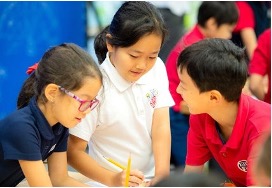
Glossary
- Metacognition – The process of thinking about thinking. When students think about their own learning, it looks something like this: “I am having trouble with concepts like this, so I will try this strategy” or “I usually take a long time with this sort of task, so I will plan a little more time”. For very young learners, this may look in early stages like self-talk about what they are doing during play or project time.Standards-based – Educational standards define the landscape of what students will learn in various subjects throughout school. In this sense, the curriculum is based on content standards that lay out important knowledge,skills, and understanding. The level to which these are to be achieved are laid out in benchmarks set for each Grade level.Formative assessment – Assessment tasks that are designed to give students feedback over time that will enable them to set goals and move forward with their learning as opposed to making a final judgment about a student’s ability.Summative assessment – Assessment tasks that are designed to capture a student’s performance at one point in time after instruction and to make a judgment about the student’s ability according to a Grade level benchmark. These assessments are used to inform report card grades.
